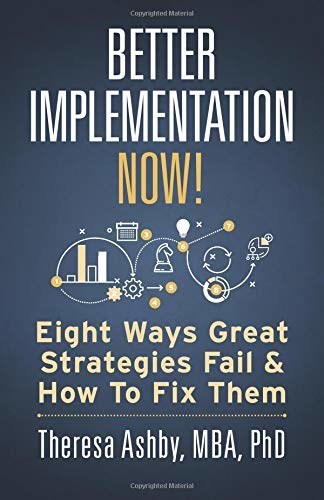MISSION VIEJO, Calif., May 22, 2019 /PRNewswire/ — Misunderstanding is a workplace epidemic, and the key to escaping misunderstanding of strategy and execution is to require everyone to stop throwing around meaningless terms.
That’s the advice of workplace implementation expert Theresa Ashby, PhD, author of the book Better Implementation Now!: Eight Ways Great Strategies Fail and How to Fix Them (2019, Indie Books International.)

“Require everyone to stop throwing terms around that are meaningless unless specificity encompasses those terms,” says Ashby. “What others do and how it is done should also be challenged, explained, and reiterated at all levels of the organization.”
Ashby is known as a stratologist, which is someone who studies and implements strategies and theories. She is the CEO of Strategic Implementation Solutions and serves as a leader with the National Association of Women Business Owners. Over the course of her 30-year career she has held many leadership roles, overseeing multi-million-dollar budgets and $1.7 billion in capital improvements.
“What kills great strategy? A lack of implementation planning,” says Ashby. “As the business adage states, successful companies work on processes versus projects. Otherwise seemingly urgent work gets in the way of real work that is needed to move the strategy forward.”
According to Ashby, egos must, by necessity, be removed and there should be no more attitude of “We get it, so why don’t they?” – or “Why should we need to define it?” – and definitely no more, “They are the issue, not me.” The days of “I got this” must be over.
“Understanding and defining the types of strategy is the first step of understanding the quagmire of terms,” says Ashby. “Organization leaders need to decipher unclear terms, get clear on what they mean for their particular organization, and address the process with clarity.”
Here are Ashby’s top ten ways to avoid misunderstandings that impede proper execution of strategy:
- Those who are identified as strategic need to make sure that those doing the work are correctly aligned and doing the right tactical work.
- An organization needs to be very clear on how, when, and why it uses the term strategy and implementation (or execution).
- Define the term strategy and implementation as it is expected to be interpreted within your organization.
- Stop identifying yourself or others as a strategic thinker and instead reinterpret it as someone who is a definer of strategy or an implementer of strategy.
- Get out of the head-and-heart state of mind, roll up your sleeves, and be laser focused on what is important, actions, reactions, and the process of just getting it done.
- Study the state of the organization and create implementable plans that work within the stages of the organizational life cycle.
- Be comfortable with uncertainty and know ahead of time that a certain amount of anxiety is part of the process, no matter how well-defined the plan may be.
- Embrace misunderstandings since they can eventually lead to more clarity.
- Slow down to speed up when it comes to explaining and communicating both terms and the expected outcomes.
- Explicitly explain the concept of WIFM – What’s in it for me.
Ashby adds that understanding and defining the organizational life cycle can assist you in an explanation of the state of the organization, why decisions are made, what are some of the driving forces behind the decision-making process, and how to accept — and not absorb — the sensations of frenzy, frustration, or failure that may arise.
About Indie Books International
Indie Books International (www.indiebooksintl.com) was founded in 2014 in Oceanside, California by two best-selling business authors. Since then the company has released more than 100 titles. Similar to indie film companies and indie music labels, the mission of Indie Books International is to serve as an independent publishing alternative to help business thought leaders create impact and influence.
Contact:
Henry DeVries
[email protected]
619-540-3031
SOURCE Indie Books International
